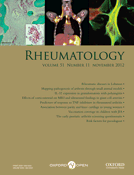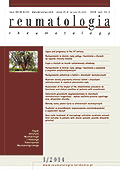
RHEUMATOLOGY
Scope & Guideline
Advancing the Frontiers of Rheumatic Disease Research
Introduction
Aims and Scopes
- Clinical Research in Rheumatology:
The journal publishes studies examining clinical outcomes, treatment efficacy, and patient-reported outcomes in various rheumatic diseases, including rheumatoid arthritis, systemic lupus erythematosus, and spondyloarthritis. - Translational Research:
Research that bridges the gap between laboratory findings and clinical applications is emphasized, including studies on biomarkers, genetic predispositions, and the mechanisms of disease. - Innovative Diagnostic Techniques:
The use of advanced imaging techniques, such as ultrasound and MRI, and novel diagnostic criteria for conditions like giant cell arteritis and ankylosing spondylitis are frequently reported. - Management Guidelines and Quality of Care:
The journal provides insights into the development and implementation of clinical guidelines for the management of rheumatic diseases, ensuring high standards of patient care. - Autoimmunity and Inflammation:
The exploration of autoimmune mechanisms and inflammatory pathways in rheumatic diseases is a significant focus, including studies on cytokine profiles and immune responses. - Patient-Centered Research:
The journal values patient perspectives and experiences, integrating qualitative research to inform treatment approaches and healthcare delivery.
Trending and Emerging
- Biologics and Targeted Therapies:
Research on the efficacy and safety of newer biologic treatments, particularly Janus kinase inhibitors and IL-17 inhibitors, has surged, highlighting their role in managing difficult-to-treat rheumatic diseases. - Digital Health and Telemedicine:
The integration of digital tools for monitoring and managing rheumatic diseases has become prominent, especially in response to the COVID-19 pandemic, leading to studies evaluating their effectiveness and patient acceptability. - Microbiome Research:
There is a growing interest in the role of the microbiome in rheumatic diseases, with studies investigating how gut and oral microbiota influence disease activity and treatment response. - Personalized Medicine Approaches:
The journal is increasingly focused on research that aims to tailor treatments based on genetic, biochemical, and phenotypic characteristics of patients, moving away from one-size-fits-all strategies. - Longitudinal and Real-World Data Studies:
Emerging trends include the use of real-world data to assess treatment effectiveness and patient outcomes, emphasizing the importance of observational studies in understanding the complexities of rheumatic diseases.
Declining or Waning
- Traditional Pharmacological Treatments:
There has been a noticeable decrease in studies focused solely on traditional disease-modifying anti-rheumatic drugs (DMARDs) without the integration of newer biologic or targeted therapies, as the field moves towards personalized medicine. - Epidemiological Studies:
Although still relevant, the frequency of large-scale epidemiological studies assessing disease prevalence and incidence has diminished as the focus shifts to more targeted, mechanistic research. - Longitudinal Studies of Established Conditions:
Research focusing on the long-term outcomes of well-established rheumatic diseases, particularly those with less immediate clinical impact, has waned in favor of studies on emerging conditions and novel therapies. - Basic Science without Clinical Relevance:
There is less emphasis on basic science research that does not have clear clinical implications or pathways to application in patient care, as the journal prioritizes translational and applied research.
Similar Journals

Current Rheumatology Reviews
Elevating standards in rheumatic disease research.Current Rheumatology Reviews is an esteemed journal dedicated to publishing comprehensive reviews on advancements in the field of rheumatology. Established by Bentham Science Publishers, this journal has become a vital resource for researchers, clinicians, and students seeking to stay abreast of the latest developments and therapeutic strategies from 2006 to 2024. Located in the United Arab Emirates, it caters to a global audience, delivering insights that have been pivotal in shaping clinical practices. With an impact factor reflective of its Q3 status in Rheumatology by 2023, the journal ranks #46 out of 73 in the Scopus database, positioning it in the 37th percentile in the discipline. Although it operates without open access, its high-quality content ensures that each article undergoes rigorous peer review, making the Current Rheumatology Reviews a trusted platform for disseminating critical research findings and reviews that drive forward the understanding and treatment of rheumatic diseases.

Rheumatology & Autoimmunity
Advancing knowledge in rheumatology and autoimmunity.Rheumatology & Autoimmunity, published by WILEY, is an emerging academic journal that delves into the intricacies of rheumatological diseases and autoimmune disorders, providing a critical platform for researchers and practitioners within the field. With an ISSN of 2767-1410 and E-ISSN 2767-1429, the journal aims to disseminate cutting-edge research in both clinical and laboratory settings, enhancing knowledge and understanding among professionals and scholars. Although currently classified in Q4 for Immunology and Allergy, and Q3 for Internal Medicine and Rheumatology as of 2023, the journal is positioned for growth and greater visibility in the scientific community. The three-year publishing span from 2021 to 2024 signifies a commitment to addressing contemporary issues and fostering collaboration among various disciplines related to immunology. As an open access journal, it provides wide accessibility, ensuring that groundbreaking research is available to a broad audience. This journal is poised to become a vital resource for those dedicated to advancing the understanding and treatment of autoimmune conditions.

Reumatologia
Fostering collaboration in the fields of Immunology and Rheumatology.Reumatologia is a dedicated open-access journal published by TERMEDIA PUBLISHING HOUSE LTD that has been serving the global scientific community since 2005. The journal focuses on the fields of Rheumatology, Immunology, and Allergy, providing a rich platform for researchers and practitioners to share innovative findings, clinical insights, and methodologies. With its roots tracing back to the early 1960s and a steady convergence of quality content through 2024, Reumatologia has secured a place in the academic landscape, currently holding a Q4 rating in Immunology and a Q3 rating in both Immunology and Allergy and Rheumatology categories for 2023. While the journal ranks #42 out of 73 in the Medicine - Rheumatology category, its open-access model ensures that research is widely disseminated, enhancing visibility and accessibility to vital knowledge that shapes therapeutic practices. Located in Poznan, Poland, Reumatologia remains a pivotal source of credible research, fostering collaboration among academics, healthcare professionals, and students internationally.

CLINICAL AND EXPERIMENTAL RHEUMATOLOGY
Elevating research standards in clinical practice.CLINICAL AND EXPERIMENTAL RHEUMATOLOGY is a prestigious journal published by CLINICAL & EXPER RHEUMATOLOGY, dedicated to advancing the field of rheumatology and immunology. With a rich history dating back to 1983, the journal serves as a critical platform for researchers, clinicians, and professionals seeking to disseminate and discuss innovative findings in these rapidly evolving areas. Featuring an impressive Q2 ranking in both Immunology and Allergy, as well as Rheumatology, this journal is recognized for its high-quality contributions, placing it among the top tier of academic publications. Operating without an open access model, CLINICAL AND EXPERIMENTAL RHEUMATOLOGY is headquartered in Pisa, Italy, and publishes articles that undergo rigorous peer review to ensure excellence in research. This journal is an invaluable resource for those dedicated to improving patient outcomes through evidence-based practice in rheumatology, immunology, and related fields.

Current Treatment Options in Rheumatology
Advancing rheumatology through innovative treatment insights.Current Treatment Options in Rheumatology, published by SPRINGERNATURE, is a pivotal journal focused on advancing the field of rheumatology through the dissemination of cutting-edge research and comprehensive reviews. With an emphasis on current therapeutic strategies, this journal aims to provide healthcare professionals, researchers, and students with up-to-date information on the latest treatment modalities for rheumatic diseases. Although it operates under a subscription model, it offers a platform for sharing significant findings that can influence clinical practice and policy within the field of rheumatology. By promoting insightful discussions and collaborations, Current Treatment Options in Rheumatology plays a crucial role in shaping the future of rheumatic disease management and improving patient outcomes.

SCANDINAVIAN JOURNAL OF RHEUMATOLOGY
Fostering Insights for Enhanced Patient OutcomesThe Scandinavian Journal of Rheumatology, published by Taylor & Francis Ltd, is a prestigious peer-reviewed journal dedicated to advancing research in the fields of rheumatology, immunology, and related disciplines. With an ISSN of 0300-9742 and an E-ISSN of 1502-7732, this journal has established itself as a vital platform for disseminating significant findings and innovative approaches in the management of rheumatic diseases since its inception in 1959. As a recognized scholarly outlet, it currently resides within the Q2 category for Medicine (miscellaneous) and ranks #39 out of 73 in Rheumatology according to the 2023 Scopus assessments. This reflects the journal's commitment to high-quality research and its relevance in the scientific community. Although it does not provide Open Access options, the journal's rigorous selection process ensures that only the most impactful research reaches its audience, making it a crucial resource for researchers, clinicians, and students engaged in the exploration of rheumatological and immunological challenges. The journal's broad scope encompasses ongoing studies, clinical trials, and reviews that aim to enhance understanding and treatment of rheumatic conditions, promoting collaboration and knowledge-sharing among professionals in the field.

Open Access Rheumatology-Research and Reviews
Pioneering Open Access Research in Rheumatology.Open Access Rheumatology-Research and Reviews, published by DOVE MEDICAL PRESS LTD, is a distinguished journal that has been a vital part of the rheumatology field since its inception in 2009. With an ISSN of 1179-156X, this journal is dedicated to disseminating groundbreaking research and comprehensive reviews in the discipline of rheumatology, making it an essential resource for researchers, clinicians, and students alike. It boasts an impressive Q3 ranking in the Rheumatology category for 2023, reflecting its relevance and quality within a highly competitive landscape, where it ranks in the 51st percentile among its peers as indicated by the Scopus Ranks. As an open-access platform, it ensures that critical findings and insights are easily accessible to a global audience, promoting collaboration and knowledge sharing. The journal's scope includes a wide range of topics within rheumatology, aimed at advancing understanding and treatment of musculoskeletal disorders and autoimmune diseases. Its headquarters is located in New Zealand, positioning it as a key player in the international research community.

Arthritis & Rheumatology
Leading the Charge in Rheumatology and Allergy ResearchArthritis & Rheumatology is a leading journal dedicated to the advancement of knowledge in the fields of rheumatology, immunology, and allergy. Published by WILEY in the United Kingdom, this prestigious journal boasts an impressive impact factor and a prominent reputation, ranking in the Q1 category across multiple disciplines, including Immunology and Rheumatology. With its high ranking of 4th out of 73 in Rheumatology and notable standings in related fields, it serves as a crucial platform for researchers, healthcare professionals, and scholars to disseminate groundbreaking findings. The journal embraces an Open Access model, enhancing the accessibility of vital research to a global audience and ensuring that knowledge dissemination is maximized. Since its inception in 2014, Arthritis & Rheumatology has been at the forefront of impactful research, fostering collaboration and innovation in tackling complex challenges within these medical disciplines. Researchers looking to explore the latest advancements and engage with cutting-edge studies in these fields will find this journal to be an essential resource.

Modern Rheumatology
Exploring Breakthroughs in Rheumatic Disease ResearchModern Rheumatology is a premier journal dedicated to advancing the field of rheumatology through high-quality peer-reviewed research. Published by Oxford University Press, this journal reflects the latest developments in rheumatologic medicine, catering to researchers, clinicians, and students alike. With an H-Index highlighting its scholarly impact, Modern Rheumatology occupies a notable position, ranking Q2 in both the fields of Medicine and Rheumatology in 2023, and is listed among the top 25 journals in its category by Scopus. Spanning from the year 2000 to 2024, the journal features a diverse array of topics aimed at addressing current challenges and innovations in the field. Although it does not offer Open Access, it provides essential insights for professionals seeking to stay abreast of evolving treatment modalities and research breakthroughs. Located in the heart of the United Kingdom, Modern Rheumatology is a vital resource for anyone committed to enhancing the understanding and treatment of rheumatic diseases.

JOURNAL OF RHEUMATOLOGY
Leading the Way in Rheumatology and Immunology AdvancementsJOURNAL OF RHEUMATOLOGY, published by the J Rheumatol Publ Co, stands as a distinguished platform within the fields of rheumatology and immunology since its inception in 1974. With an impressive impact evidenced by its 2023 rankings—Q1 in Rheumatology and Q2 in both Immunology and Allergy—the journal has secured its position as a vital resource for researchers and practitioners alike. The journal is dedicated to advancing clinical and experimental knowledge in the pathogenesis, diagnosis, and management of rheumatic diseases, providing a rich repository of peer-reviewed articles that drive innovation in treatment protocols and patient care. Although it operates under a subscription model, the journal remains accessible to a broad audience committed to advancing their understanding of these critical areas. Located in Toronto, Canada, it continues to attract contributions from leading experts globally, making it an essential read for anyone keen on staying at the forefront of rheumatological research and practice.